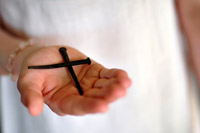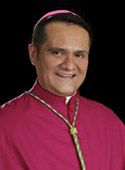
Let's Be Easter People
 During the Easter season we celebrate our passing from darkness into light — from death into life. The Son of God has ransomed us through His blood so we may find our way back to the Father. Jesus restored the life of unity to which we have been destined from our creation — unity with God, creation, and one another. In the resurrection of Jesus, we find a new way of life — a life of harmony and love which reflects the communion of the Trinity. The resurrected Jesus calls us to transform everything that divides the human community. We celebrate Easter when we embrace one another as brothers and sisters in God.
During the Easter season we celebrate our passing from darkness into light — from death into life. The Son of God has ransomed us through His blood so we may find our way back to the Father. Jesus restored the life of unity to which we have been destined from our creation — unity with God, creation, and one another. In the resurrection of Jesus, we find a new way of life — a life of harmony and love which reflects the communion of the Trinity. The resurrected Jesus calls us to transform everything that divides the human community. We celebrate Easter when we embrace one another as brothers and sisters in God.
Through the Holy Spirit we pray that we be made one in peace and love. As our Lenten fasting and discipline comes to an end, let’s continue working toward this life of communion. Among the many ways of division in our society, racism is one. Vatican II affirms that “any kind of social or cultural discrimination in basic personal rights on the grounds of sex, race, color, social condition, language or religious, must be curbed and eradicated as incompatible with God’s design.” (GS no. 29).
Cardinal Francis E. George in his pastoral letter on racism, “Dwell in my Love,” affirms that the face of racism continues nowadays in more subtle patterns. He describes four forms of racism:
- Spatial: When there exist patterns of development in which some affluent people create racially and economically segregated suburbs, leaving the poor isolated in deteriorating areas.
- Institutional: Institutions that privilege people like themselves and habitually ignore the contributions of other peoples and cultures.
- Internalized: Many blacks, Hispanics, Asians and Native Americans are socialized and educated in institutions that celebrate only the contributions of whites and devalue the presence and contributions of people of color.
- Individual: When individuals automatically award superior status to their own cultural group and inferior status to all those outside it.
From the beginning of our Catholic tradition, the Spirit has moved us to see beyond the limitations of our own ethnic and religious group. The Acts of the Apostles tell us of the challenges that come when we try to bring people together with respect for their individuality and uniqueness of our heritages.
In our culturally diverse Catholic Church, we speak of ourselves, sometimes, as Irish Catholic, German Catholic, Polish Catholic, Hispanic Catholic, African-American Catholic. Following the example of the first Christians, we are called to see our differences as gifts to be offered to others rather than obstacles to keep others out.
We confront the sin of racism in our society and become agents of transformation when we welcome one another as brothers and sisters in culturally and racially inclusive parishes and communities. It is then that we become Easter people, a light to the nations.
From the beginning of our Catholic tradition, the Spirit has moved us to see beyond the limitations of our own ethnic and religious group. The Acts of the Apostles tell us of the challenges that come when we try to bring people together with respect for their individuality and uniqueness of our heritages.
In our culturally diverse Catholic Church, we speak of ourselves, sometimes, as Irish Catholic, German Catholic, Polish Catholic, Hispanic Catholic, African-American Catholic. Following the example of the first Christians, we are called to see our differences as gifts to be offered to others rather than obstacles to keep others out.
We confront the sin of racism in our society and become agents of transformation when we welcome one another as brothers and sisters in culturally and racially inclusive parishes and communities. It is then that we become Easter people, a light to the nations.
Sr. Ruth BolarteSister Ruth Bolarte, I.H.M., is the director of the Catholic Institute for Evangelization in Philadelphia.
go back
 “The New Evangelization impels us to continue joyfully responding to the Spirit that never ceases to stimulate our communities to a deep conversion. Our call to celebrate the Gospel and to proclaim it to all our communities is at the very core of the creative ministry of the FIP. With years of Hispanic experience the Federation will continue to respond to the challenges of today’s world and will continue to serve by offering excellent faith, academic, and ministerial formation to our communities and beyond.”
“The New Evangelization impels us to continue joyfully responding to the Spirit that never ceases to stimulate our communities to a deep conversion. Our call to celebrate the Gospel and to proclaim it to all our communities is at the very core of the creative ministry of the FIP. With years of Hispanic experience the Federation will continue to respond to the challenges of today’s world and will continue to serve by offering excellent faith, academic, and ministerial formation to our communities and beyond.”